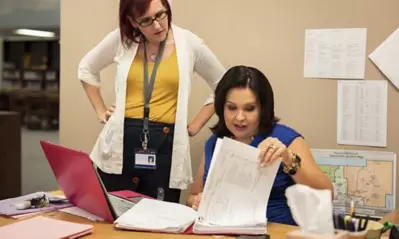What is EdTech?

Written by Michael Feder

Reviewed by Pamela M. Roggeman, EdD, Dean, College of Education
Education technology, also known as “edtech,” refers to the educational hardware and software tools designed to improve teaching outcomes as well as the methods for implementing such tools in the classroom.
Where is edtech being used?
Many universities offer edtech alongside theory, methods and pedagogy that aim to improve learning outcomes through technology. When an instructor requires students to collaborate and discuss certain subject matter through a digital-learning chat platform, for example, that’s educational technology at work.
According to the National Association of Homebuilders, 13.9 percent of those working in education, training and library services as of April 2025. Certain methods, such as challenge-based gamification in e-learning, may improve student performance by as much as 89%.
While it is a broad subject, modern educators should be aware of this burgeoning field. Those who do will find opportunities to wield it in an effort to produce better educational outcomes.
Benefits of education technologyÂ
Edtech has the potential to benefit students, teachers, the education community and society at large. How? For starters, education technology can facilitate better technological literacy via remote learning, which can help students thrive in a post-pandemic world where hybrid work and learning environments abound.Â
But that’s just the beginning. Here are some more potential advantages.
Opens up remote-learning possibilities
While e-learning had existed before the pandemic, the model has now been tested en masse with the benefits of hybrid learning in a post-COVID world becoming more apparent. These benefits (like safety and cost efficiency) make remote learning a more viable option even when circumstances don’t require it. With adequate Wi-Fi, laptops and cloud access, students are now better able to learn wherever they are, unbound by physical and geological restrictions.
Allows educators to do more
Edtech tools allow teachers to explore blended learning approaches in an era when remote learning and working are becoming the norm. It also opens the door to expanded curriculum and an ability to engage in varied teaching practices and methods.
Sometimes, the value lies in ways that it can enhance what teachers already do. Edtech can expand opportunities for: Â
- Differentiated instruction
- Data-driven instruction
- Higher-order feedback
- Mastery-based instruction
- Problem-based learning
- Project-based learning
- Small-group instruction
- ¸é±đ±ô˛ąłŮľ±´Ç˛Ô˛őłóľ±±č-˛úłÜľ±±ô»ĺľ±˛Ô˛µĚý
There are big-picture benefits, too, like the ability to meet students remotely and provide support for multiple learning styles.
Helps students with different learning styles to engage actively in their education
Education technology and e-learning allow educators to further personalize their teaching styles to match students’ learning styles.
For example, video- and audio-based modules cater to students who prefer to see and hear their lessons. Some platforms even use artificial intelligence to create personalized teaching approaches that empower students to pursue in-depth study of a given subject. This approach can save the student time and inspire an appreciation for education in general by matching lessons with an individual’s interest and aptitude.
Simpler solutions might cater to kinesthetic learners, allowing them to turn their phones into virtual reality headsets. Simulated field trips across the world, for instance, can immerse the learner in subject matter that feels strikingly similar to “the real thing.” Additionally, augmented reality can provide a sort of overlay to the real world, which could be just as useful in education as in job training.
Just as educational tech tools and theory are becoming more ubiquitous in schools and universities, e-learning modules and practices are quickly becoming cornerstones of workplace training and upskilling. This is just one reason future leaders can benefit from understanding different learning styles in the same way many educators do.
May lead to better learning outcomes
The argument can be made that edtech leads to better learning outcomes, and there are studies that corroborate this position in certain circumstances. For example, a  took an expansive look at the state of education technology, how student outcomes fared in different circumstances and countries, and its future place in education.
While there are many ways educational technology can potentially produce better outcomes, there are still many things left to understand concerning the efficacy of these methods. The same McKinsey report cited above also mentions several findings that speak to these nuances. For example, the type of device learners and teachers use matters, and some are associated with worse student outcomes.
How to keep up with edtechÂ
Educational technology can help lead to better learning outcomes under the right circumstances, and those circumstances should include educators who are familiar with the nuances of current solutions and methodologies.
One way to get familiar with these tools is through higher education. Education degrees at the postsecondary and graduate levels offer in-depth knowledge on teaching methods, educational theories and, yes, edtech.
Another great way to keep up with the use of technology in education is to read educational blogs or subscribe to an e-newsletter or RSS feed. Additionally, you can find news and influencer accounts to follow on social media, as well as podcasts, which may also help you keep up with the latest in e-learning technologies and pedagogies.
Appropriately, the way you decide to engage in continued learning on the subject depends entirely on your learning style — and fortunately, there are plenty of tools, many of them digital, that can help you to stay abreast of the subject.
Learn more about edtechÂ
Would you like to learn more about edtech and its applications in the classroom? ąű¶łĘÓƵ offers education programs, including a Post-Master’s Certificate in Educational Technology (CERT/D-ET).
Contact ąű¶łĘÓƵ for more information.

ABOUT THE AUTHOR
A graduate of Johns Hopkins University and its Writing Seminars program and winner of the Stephen A. Dixon Literary Prize, Michael Feder brings an eye for detail and a passion for research to every article he writes. His academic and professional background includes experience in marketing, content development, script writing and SEO. Today, he works as a multimedia specialist at ąű¶łĘÓƵ where he covers a variety of topics ranging from healthcare to IT.

ABOUT THE REVIEWER
As dean of the ąű¶łĘÓƵ College of Education, Pamela Roggeman has spent over a decade in higher education teacher preparation in both the public and private sector. Her experience has included national partnerships that help to advance thought leadership in the field of education. Dr. Roggeman also serves as the President of the Arizona Educational Foundation’s Board of Directors.
This article has been vetted by ąű¶łĘÓƵ's editorial advisory committee.Â
Read more about our editorial process.



